Tết (Lunar New Year) this year provided a memorable experience for my family and friends as we experienced the daily life of the Thai ethnic group in Pù Luông Nature Reserve in the central province of Thanh Hóa, about 150 kilometres from the capital.
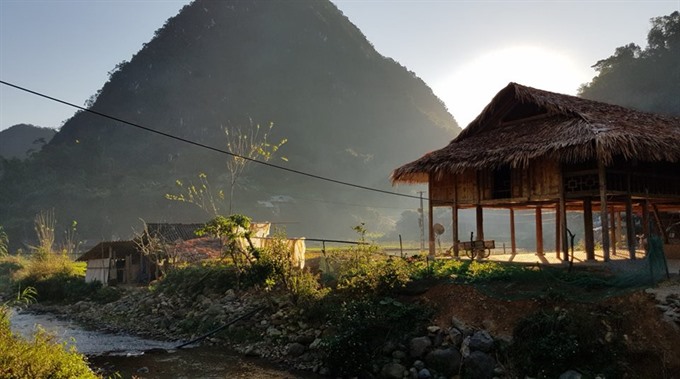
A corner of Kho Mường Village in the central province of Thanh Hóa. — Photo Kim Cương
Pù Luông is an ideal destination as it is not too far from my beloved Hà Nội and not too expensive, while being surrounded by nature.
It was sunny and hot during Tết, which is strange in Việt Nam. We visited Pù Luông with the expectation of enjoying fresh, cool air from the the mountains as well as hiking through the forest.
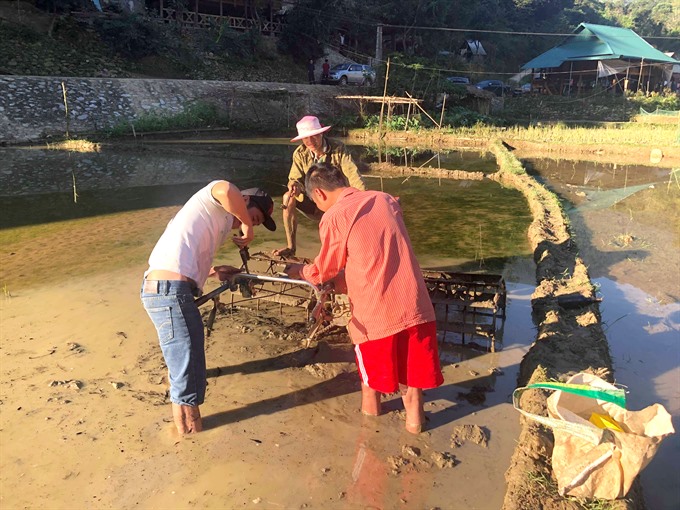
Local farmers fix a tractor on the paddy field in Kho Mường Village. — VNS Photo Thu Giang
Our first destination was Kho Mường Village in a very pristine and rustic valley of the same name. It is one of the most difficult villages to reach but an ideal area for visitors who like community tourism.
There are several paths to the village but only one road for cars. The road is dangerous because it’s very narrow with a steep drop on one side and the mountain on the other. The path is nearly three kilometers through the forest down from the main road.
Looking down, Kho Mường is surrounded by vast green mountains and forests. There are stilt houses close to the foot of the mountain and paddy fields, where farmers plant rice and plough the land while others raise ducks.
We arrived at Kho Mường Village at noon. The sound of birds and a stream meandering down through low hills relieved our tiredness after a half a day in the car and walking through the forest. We were welcomed with glasses of cool herbal tea and delicious chicken soup at a stilt house owned by Hà Văn Nếch, who was also our tour guide.
Nếch said that local residents were mainly Thái ethnic minority people, who make a living by cultivating rice, corn and cassava and breeding pigs, chickens and ducks. Thanks to what nature offers, people are able to build spacious stilt houses to welcome tourists.”
About one kilometre from Nếch’s house is Dơi (bat) Cave, on of the most beautiful in Pù Luông Nature Reserve.
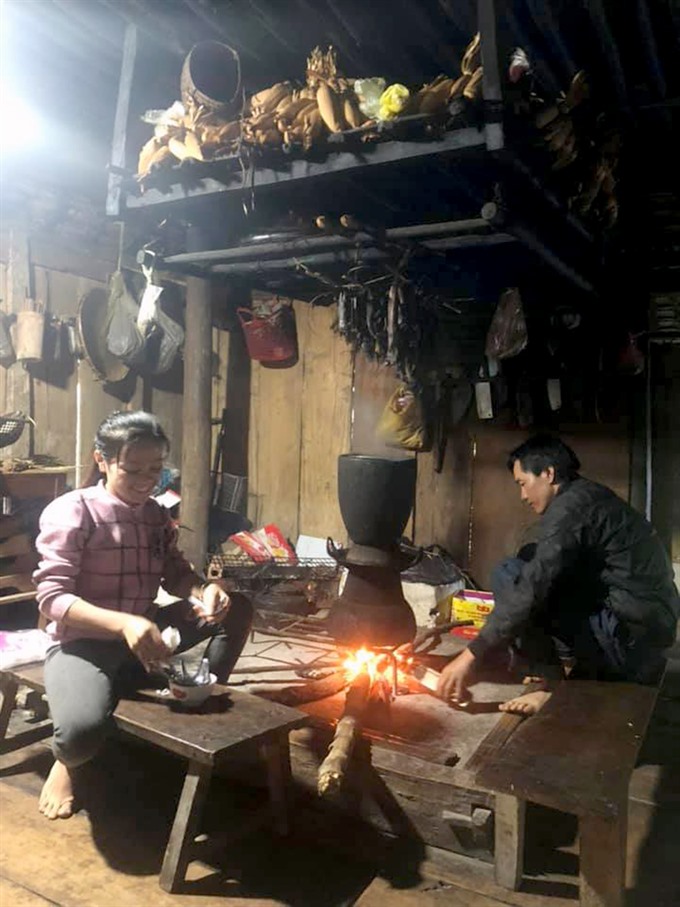
Nếch’s family members prepare dinner for visitors. — VNS Photo Thu Giang
“This cave is made out of limestone, which was formed hundreds of millions of years ago. It is connected with the underground river system about 2.5km to the north,” Nếch said.
Dơi Cave is home to at least four species of bats, and houses rock formations that resemble people, trees and animals.
Leaving the cave, we went back to Nếch’s house for a dinner of chicken, vegetables and wine next to the dancing flames of a wood stove. I then fell asleep to the sound of the insects outside.
The second day was a memorable one for me. I was awakened by the sound of a tractor and a flock of ducks feeding in the paddy field. The peaceful atmosphere, fresh air and glutinous rice with salted chicken packed by Nếch and his family made filled me with the energy to begin a new day of hiking in the forest to Đôn Village.
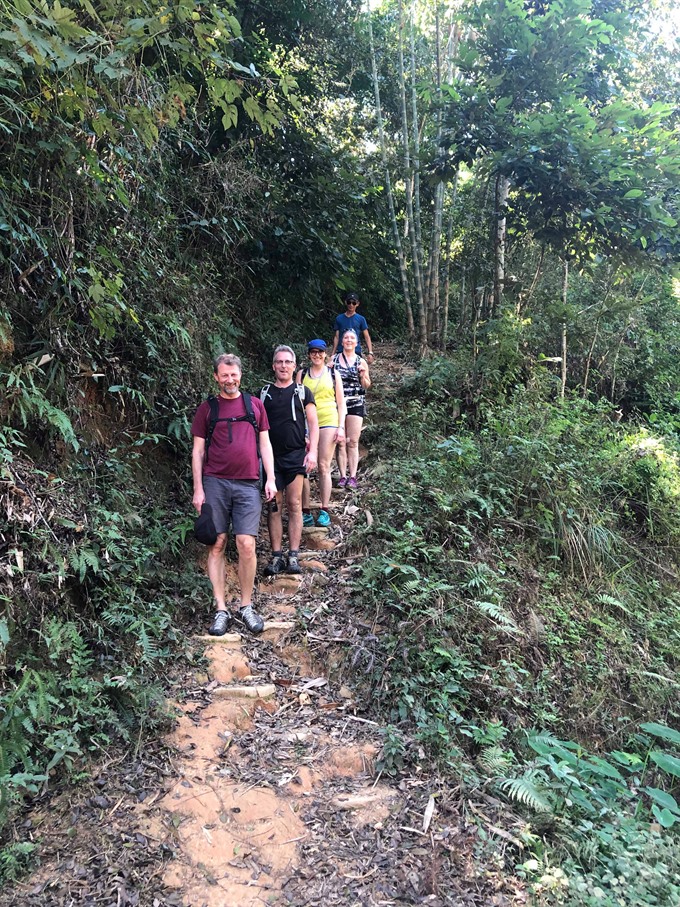
A group of foreign visitors on the way down from Đông Village. — VNS Photo Thu Giang
Hiking through the forest is always exciting, enjoying the fragrant smell of various trees and grasses. We had a party of 15 including some children, so we were forced to walk in single file on a narrow on the cliff edge, but we were still able to enjoy the scenic beauty of the greenery with the sunshine.
After walking for eight kilometres we reached Đôn Village at noon. Đôn Village is surrounded by large terraced paddy fields. Its amazing scenic beauty has become famous in recent years and attracted a lot of domestic and foreign visitors.
Nếch told me that the best times of the year to visit Pù Luông were April-May when the rice was being harvested and September-October when the field was lush with ripening rice. There are many stilt houses in the village where visitors can enjoy a peaceful space, beautiful natural landscapes and specialties of the welcoming Thai ethnic minority people such as bamboo shoots, ducks, pigs, chickens and squash leaves.
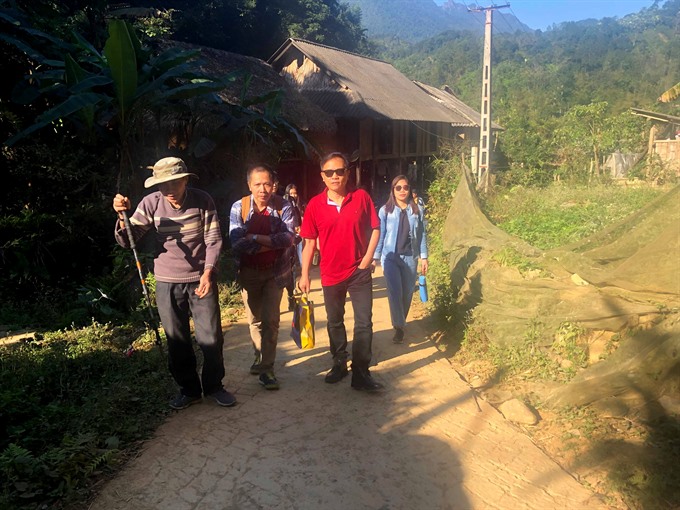
Hà Văn Nếch (left) guides visitors through Pù Luông Forest. — VNS Photo Thu Giang
We stopped at Hà Thanh Tùng’s house at the end of the village to get a much-needed lunch. We enjoyed fish, local grilled pork, bamboo shoots and đòng đanh, a local vegetable.
Pù Luông is the highest mountain at a height of 1,700 metres above sea level in the area.
I suddenly heard laughing from kids and decided to find them. The image was really cute as they, foreign kids, were playing with water in the terraced field. Their faces had turned red under the sun and their legs and arms were covered in mud. They looked very happy. It must have been the first time they’d enjoyed that exciting feeling.
I know I will go back to enjoy the smell of ripening rice as well as the local hospitality. — VNS